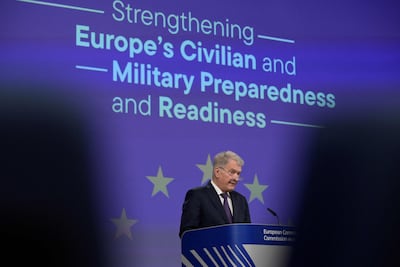For Europe, this is the eve of its ultimate crisis.
Donald Trump’s candidacy for the US presidency is a movie that may have run before, but the prospect of a second term is sending shockwaves through the European elite. Leaders are scrambling to have an answer, preferably a readymade set of solutions, for what to do about such an eventuality.
One of those leaders is European Commission President Ursula von der Leyen, who last week took a significant step to raising Europe’s game in one key area where there is an almost complete void: intelligence.
The trade craft that surrounds intelligence is something that European member states have hitherto kept as a monopoly. Some countries have stellar reputations in this area, others have barely any capacity at all. With the world divided into blocs, Ms von der Leyen is now seeking the tools to match the EU’s economic might with its global strategic impact.
The organising feature is the need to have preparedness, by design, for whatever is coming down the track. Ms von der Leyen herself is currently transitioning for a second term. With Charles Michel and Josep Borrell leaving their posts as President of the European Council and High Representative for Foreign Affairs, respectively, the former German defence minister has a unique responsibility for drawing up the plans for after January 20, when the new American president is inaugurated.
Tariff wars have been much on the minds of some Brussels watchers, with Mr Trump vowing to impose levies of up to 60 per cent on goods. So, too, has been the fate of war-torn Ukraine. Hungarian Prime Minister Viktor Orban, who is one of a rare breed of Trump backers in Europe’s power circles, is predicting a pivot there should the former president seal a remarkable comeback. “If Americans switch to peace, then we also need to adapt,” Mr Orban said this week.
The outbreak of the war in Ukraine was a classic demonstration of disarray in European intelligence capabilities. The US had foreseen Russia’s actions and had a strategy of pre-emptive leaks to disrupt the Kremlin’s plans. Some European agencies rejected the US’s judgments, while others said there was nothing happening at all.
Suspicions linger that Russian infiltration in European spy agencies is part of the patchwork of intelligence across the continent. Even the best of the bunch has had their troubles. The French DGSE, for example, is still smarting from its failures in the Sahel, as Paris lost its foothold in a domino-effect collapse across that region after the Covid-19 pandemic.
The issue of intelligence has reared its head at a time when there is nostalgia on the continent for the Cold War spies in popular culture.
The relaunch of the late British author John Le Carre’s George Smiley Series of espionage novels along with compatriot Nick Harkaway’s novel Karla’s Choice underlines how the fascination with European spying has not really diminished.
The character George Smiley first appeared as an agent navigating Europe’s divisions in 1964. Karla in Harkaway’s novel is a Russian infiltrator from the 1974 Le Carre novel Tinker Tailor Soldier Spy. The key figure in the new book is Susanna, a Hungarian exile looking for her missing emigre boss.
Meanwhile, the advertising hoardings on the London Underground station next to the MI6, the UK’s external intelligence agency, have been taken over by ads for the remake of The Day of the Jackal movie, proclaiming that the protagonist is always “one step ahead of MI6”.
The report to Ms von der Leyen, written by former Finnish president Sauli Niinisto, seeks to make an arrangement called the “Single Intelligence Assessment Capacity” the centrepiece of Europe’s revamped espionage services. It recommends a fully fledged intelligence co-operation service at the EU level that can serve both the strategic and operational needs.

This is important because it goes to the heart of the debate in the agencies about how to change to meet both greater hostility, trending again to Cold War levels, and rapid technological vulnerabilities.
During a discussion in February, some former UK spy chiefs offered a glimpse behind the curtain. While the traditional model has seen a domestic agency evolve that is very focused on operational activities, other agencies are dominated by specialists in personal relationships – like the Smiley of Le Carre fame – while still others are prized for expertise in data and cyber warfare.
One of the big issues facing the spy chiefs is whether this needs to be brought together. Creating a new EU-wide intelligence apex organisation is both a chance to start afresh with structures designed for the current threats and presents a daunting series of choices at a time of maximum pressure.
The section on intelligence in Mr Niinisto’s report has three pillars, not just the enhanced analysis and co-operation of a Brussels-based agency, but the capability to deter threats by denial of the European space to meddle, and deterrence by the capacity to punish adversaries for orchestrating hostile campaigns.
All this comes within the wrapper of a European Defence Production Act that will make self-reliance a top priority. Scaling up Europe’s abilities to make its own choices in defence is no longer an urgent issue but a strategic imperative.
Whatever happens in America in the coming days and weeks, Ms von der Leyen has a framework for unavoidable change. The important question is, will it be implemented fast enough regardless of who goes on to occupy the White House in January?


